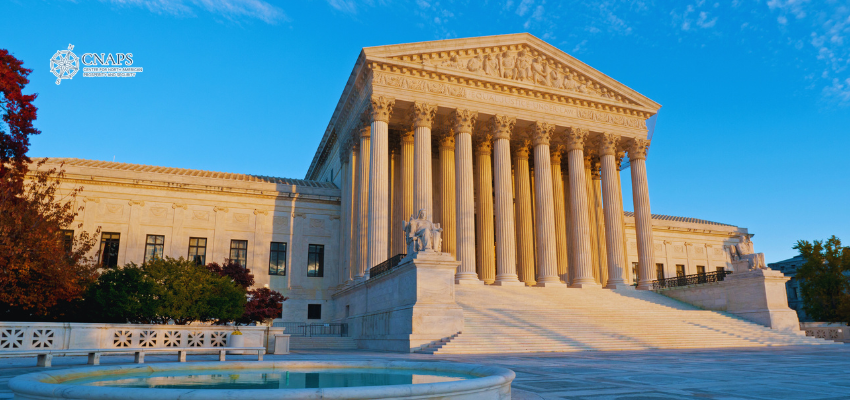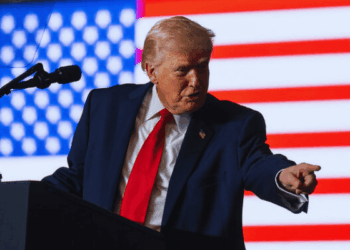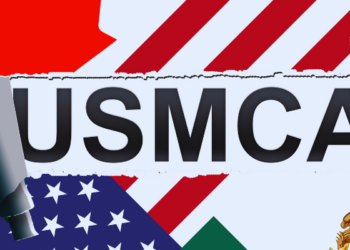This article originally appeared in The Hub.
By Geoffrey Sigalet, August 12, 2025
Could American courts end up being allies for Canada in the tariff tiff with President Trump?
It looks like this might not just be a pipe dream.
The U.S. Federal Court of Appeals for the Federal Circuit heard arguments in V.O.S. Selections et al. v Donald J. Trump last week. This high-profile case challenges President Trump’s use of the 1977 International Emergency Economic Powers Act (IEEPA) to declare a national emergency and impose tariffs on much of the world, in addition to more specific tariffs imposed on Canada.
After listening to the oral argument at the Federal Court of Appeals, I am struck by two points. First, the hearing did not go well for the president’s lawyers. Second, although plain questions of statutory interpretation took centre stage, constitutional arguments often associated with legal conservatism (e.g., a stricter understanding of the separation of powers) appeared to help tip the scales against the president’s case.
What is V.O.S. Selections about?
Those unfamiliar with the U.S. Constitution’s separation of powers likely won’t know why this case is controversial. The U.S. Constitution explicitly grants Congress, not the president, power over the imposition of “Duties, Imposts, and Excises” and requires all revenue bills to originate in the House of Representatives. As such, all presidential authority for imposing tariffs must be authorized by statutes enacted by Congress.
President Trump relies on the 1977 IEEPA as delegating authority for him to impose tariffs in the face of a national emergency relating to “the sustained influx of illicit opioids and other drugs” from Canada. He has also declared longstanding U.S. trade deficits part of a wider national emergency justifying the imposition of 10 percent tariffs on “all imports from all trade partners,” and further higher tariff rates on 57 other countries. A lower court unanimously halted Trump’s main raft of tariffs, but that is now being appealed in V.O.S. Selections.
Canada is not at the centre of this litigation; the world is. But a victory for the plaintiffs would also constrain Trump’s tariffs on Canada.
The president’s lawyers essentially rest their case on a clause of IEEPA that authorizes the president to “regulate… imports.” They claim that tariffs are a key tool for regulating imports, and cite a 1975 case called United States v Yoshida International Inc.
In Yoshida, the U.S. Court of Customs and Patent Appeals upheld President Nixon’s attempt to resolve the balance of payments crisis (this is the period where Bretton Woods collapsed) by imposing a temporary (it lasted only five months) 10 percent surcharge of duties on imports. The Court accepted that the surcharge duties were justified by the Trading with the Enemy Act (TWEA) of 1917’s authorization of the president to “regulate… imports.” In V.O.S., President Trump’s lawyers have argued that the 1977 IEEPA was meant to replace the TWEA and continue to authorize the kind of power to impose duties that was upheld in Yoshida.
The lawyers for the plaintiffs argue that the history of Nixon’s tariffs and the enactment of IEEPA undermine President Trump’s case.
They argue that there is evidence that IEEPA was meant to be more constraining than the TWEA that was used to uphold Nixon’s tariffs in Yoshida. The plaintiffs also argue that because courts may not read statutes to grant broad economic powers without clear Congressional authority, and because IEEPA offers no direct grant of tariff power, IEEPA cannot be read as authorizing the Trump administration’s sweeping tariff policies. They point out that in “every” example of Congressional statutes authorizing tariffs, the law uses the word “tariff” or an equivalent like “duty.”
The Sword of Yoshida
The oral argument did not start out well for President Trump. Right out of the gate, the judges interrupted the assistant attorney general for the Department of Justice, Brett Shumate, to point out that, in the 50-year existence of the IEEPA, this is the first time it has been used for tariffs. The interrogation continued to drill down on why “tariffs” should be understood to be part of IEEPA’s authorization to “regulate… imports.” The sheer novelty of the president’s order haunted Shumate’s impressive attempts to convince the judges that they should treat the language in IEEPA the same way the language of TWEA was used to uphold Nixon’s temporary surcharge tariffs in Yoshida. Shumate’s strategy was to get the judges to accept that Yoshida meant that they must accept that the phrasing “regulate… imports” delegates at least some tariff powers to the president.
A number of the judges appeared unconvinced, appearing to agree with the plaintiff’s argument that in every other law where Congress delegates tariff power, it uses the term “tariff” or cognates. Shumate’s skill as a lawyer might have succeeded in convincing some of the 11-judge panel that the words “regulate… imports” delegate some tariff power, but then his next hurdle was skepticism about how different the scope of Nixon’s tariffs were in Yoshida from what Trump is up to in this case.
A major problem for Shumate was that Yoshida itself contained language that appeared to require a narrow and limited view of the types of tariffs that could be justified as emergency regulations on imports. A skeptical judge read out some of this language from Yoshida as a challenge to Shumate:
“The mere incantation of ‘national emergency’ cannot, of course, sound the death-knell of the Constitution. Nor can it repeal prior statutes or enlarge the delegation in § 5(b). The declaration of a national emergency is not a talisman enabling the President to rewrite the tariff schedules.”
The implication? Unlike Trump’s non-temporary and expansive tariff orders, Nixon’s tariffs could only be understood as emergency regulations on imports because they were temporary and limited. Later on, the plaintiff’s lawyer theatrically pounced on this point by declaring that “if you want to live by the sword of Yoshida, you’re going to die by the sword of Yoshida.”
Could Trump lose?
If I were a betting man, I would take President Trump losing this case. Nevertheless, I see a chance of a softer loss for the president from a dissent or concurrence. The overall tenor of the oral argument was not encouraging for the president, and it is relevant that the panel is composed of eight Democratic and only three Republican appointments (none by Trump).
Even worse for President Trump, the arguments put forward by the plaintiffs were well designed to appeal to legal conservatives who have long been skeptical about the ever-growing bounds of executive power. That is not a coincidence. The plaintiff’s brief is signed as counsel by none other than Stanford Law School’s Professor Michael McConnell, a former judge of the Court of Appeals for the Tenth Circuit and one of the preeminent and most brilliant legal conservatives in the U.S., who in turn is also well-liked by liberals. And beyond McConnell, the list of lawyers working for the plaintiffs is similarly impressive.
However, if enough judges are convinced that Yoshida means that IEEPA offers some tariff power to the president, they may dissent or concur in a way that offers Trump a window for enacting temporary and limited tariffs that look more like Nixon’s. It is even possible that this moderate position could gain a majority on the Court of Appeal. In turn, that view could prove popular at the Supreme Court, given that the Court is particularly concerned about maintaining its institutional legitimacy in the face of an unpredictable president. But before Canadians get too excited, we should remember that even if Trump loses, Congress could amend IEEPA or other tariff laws to grant him the authority he claims he already has.
That said, the arguments in V.O.S. Selections were carefully crafted by McConnell and his team to appeal to the conservative majority on the Supreme Court. If those arguments win out, Canadians and much of the world will owe the American judiciary and Professor McConnell’s band of lawyers a great debt. Americans too.
Geoffrey Sigalet is the director of the UBC Research Group for Constitutional Law, an assistant professor of political science at UBC Okanagan, and Senior Fellow at the Macdonald-Laurier Institute.








